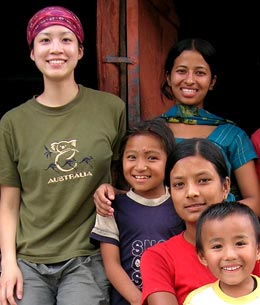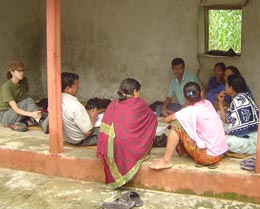COPPADES (Kathmandu and Lamjung, NEPAL)

Janye Lee with villagers in the Lamjung region of Nepal |
This informal report about my IHRP summer internship briefly describes my work with COPPADES, a grassroots NGO in Nepal. COPPADES promotes economic and social rights for the poorest of the poor within the Lamjung region in Nepal. In particular, COPPADES focuses on the right to sustainable income and women's rights.
COPPADES teaches and develops micro-financing in villages, with the ultimate goal of forming a legally recognized co-operative. Co-operatives are similar to corporations, but they provide banking services. Savings and loans may be made by villagers in order to invest in a small business, such as goat or vegetable farming, that may improve their economic situation. However, many Nepalis are illiterate. Thus, COPPADES assists in completing legal documents and explaining the key points. More importantly, when co-operatives do not operate smoothly (loans are not paid, money disappears), the role of COPPADES as a mediator is key to solving conflicts. The government or third parties are simply unavailable to provide support in resolving issues.
COPPADES also supports women's rights by disseminating modern family planning to villages. By educating women, COPPADES hopes to give them the knowledge they need to control their reproductive rights and protect their health from sexually transmitted diseases.

Janye Lee (left) attends a meeting, part of the COPPADES program |
In light of these two major goals, I independently researched women's economic rights, particularly women's property rights. My reading revealed that women have virtually no right to own property, whether as a daughter, a wife or daughter-in-law, or a widow. In some manner, the property is controlled by her husband or son. Many Nepali academics believe the inability to own property results in women being in a vulnerable position. Since women have 'no worth', they are more susceptible to sexual abuse, domestic violence, sex-trafficking, illiteracy, and bonded labour. Many critics argue that women's lack of property rights violates the Charter of Rights of Nepal, which guarantees equality. However, when a female advocate challenged the laws, the Supreme Court of Nepal found that Nepali culture was not ready for such a change and only recommended that reform be investigated.
COPPADES attempts to empower women through women-only cooperatives, where women are taught to save. From the savings, they are able to get loans and start small businesses. COPPADES also trains women in different types of farming and retailing. However, I felt a presentation on women's economic reforms would help provide an overall, long-term direction or goal to be achieved. I am currently completing and reviewing a presentation for COPPADES. I hope they will translate and share the presentation with the Nepali women during their workshops and training sessions. Given the political situation in Nepal now, this may be good timing, with the new government, the change from a Hindu to a secular state, and the rise of women's advocacy.


